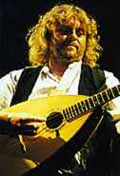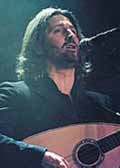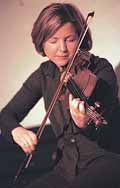 |
||
The Living Tradition
|
|
|||
| Michael McGoldrick - Goes
back to his roots Issue 44 July/August '01 - by Steve McGrail |
|
|||
 |
||||
|
One of the characteristics of emigrants anywhere is that they take their music with them wherever they go, and then proceed to enrich whatever existing culture they find themselves in - as well as usually being enriched by it in turn. Their songs and tunes and dances cheer them, lonely exiles in strange towns and cities; and as a focus for dreams and hopes, the music brings them all together. The nation that has got this down to a fine art, of course, is the Irish. London's musical scene, for instance, was changed forever by the arrival of thousands of Irish folk in the Fifties and early Sixties. Now, half a century on, other British cities like Birmingham, Leicester and Manchester are also reaping the rewards of their own influxes; so much so, that now, 'if it's Irish, it's got to be good!' "It's all about the crack", people say knowingly, rather as if Ireland had actually invented that term. (Sadly, it's originally English, just as Ireland's famous export the jig almost certainly is too). Nevertheless, there really is something very special about the country's music. And it's one reason that it transmits pretty reliably from one generation to another, also. A particularly clear example of such transmission is Manchester-born Michael McGoldrick, the highly talented flute-playing son of a highly talented Galway whistler. Amongst Michael's many achievements, for example, is winning this year's Radio Two Folk Award for Best Instrumentalist. His musical sources go way back, but not to the extent that he's forgotten that fact nor is taking it for granted. Right now, indeed, he's revisiting those sources in various ways. One is by teaming up with ace Belfast piper John McSherry, himself from a famous musical family. The pair are currently producing a CD, which as John puts it is "us getting right back to our roots". The CD, Michael explains, is going to be in traditional style. "It'll just be us, acoustic bass and guitar. We came together simply because we thought it would be nice to do something from our shared traditions. Obviously we've played together before (like in Lúnasa) but this is a new departure. I myself have recently done a contemporary album, 'Fused', but this one will be quite different, won't have the loops and dropped beats etc. When I left home for the studio in Glasgow and John left Belfast, we had no real idea what we'd do. We haven't even got a name for it yet, though it'll be out in July. But we've put down some tunes like 'Graf Spee', a great four-part reel, and 'Rolling Waves' and Liz Carroll and Donald Shaw tunes. And two by ourselves. Now, Irish tunes are usually called things like 'Sweet Mayo' but mine is 'Failte gu Whalley Range': ok, it hasn't got quite the same ring but it celebrates where I once lived". "Mine is 'Lady Lane', a place in Dublin where I stayed with my girlfriend", chips in John. "They were... happy times", he adds rather wistfully. In some ways, the recording represents a relatively quiet spell in Michael's busy career. Basically, he's been performing more or less professionally for half his life since he started with Toss the Feathers when only 15. The band would routinely play weekends in London. They'd drive down, play, and sleep in the van outside the venue - The Swan in Stockwell, say. Then it was a dash back to get him to school on Monday. (The rest of the band were in their twenties). On leaving school, he worked in a haulage firm and laboured for his dad. The band grew more popular, but mid-week gigs made taking time off work increasingly tricky. "So I thought I'd just be a full-time musician instead. I thought I could live off music, and anyway, it seemed a good laugh. It was, but hectic, since we were playing even further afield. But at that age you don't care that it's pretty hard on the road, you feel you can do anything". He stayed with the band ten years altogether. Some parents might have jibbed at a fifteen year-old regularly gigging. His didn't. They positively encouraged it; just as well, since he'd had no music at school. ('I simply hated the teacher'). Both were musical. His mum from Castlebar in Mayo sang, and his dad from Dunmore played whistle. The four children started on whistle through hearing their dad. "He'd come home from work and play a few tunes to unwind. We'd listen, and we'd somehow learn them by osmosis, things like 'The Sally Gardens', and we could play them by the end of the week. I never learned to read music, everything's done by ear". His mum's big contribution was faithfully taking them to the local Comhaltas Ceoltóirí Éireann branch every Wednesday. "Kevin Madden the fiddler taught there and Delia Buckley from Roscommon. They charged peanuts, just did it for the love of the culture. Delia was amazing, she taught piano, bodhrán, accordion, fiddle, whistle - you name it. It was fun and I made musical friends at Comhaltas that I've still got, like Desi Donnelly and John Joe Kelly". "Irishness, from food to music was everything at home. But not Gaelic, sadly. Dad spoke it in Galway, but it's not much needed in the gas industry in England... I'll maybe learn it myself one day... Still, we heard the Showbands, joined the Catholic clubs, did the competitions. Also, of course, I was hearing recorded music. Stockton's Wing and Moving Hearts were great influences, and Roger Sherlock and Seán Maguire - and Matt Molloy, naturally, maybe the best flute player ever. But I wasn't merely into Irish stuff, I liked rock and pop: I was drumming and playing flute in an REM-type band, even! I'd had a flute since I was 14. Dad had bought me one, £750 - expensive, because he believed in me that much. (Instrument-wise, he's moved on now, of course, with a Peter Murbeth flute from Brittany and a Michael Grinter from Australia. He has a wide range of flutes - 'handy when you're accompanying singers' - and Overton and Hardy whistles. Currently, Phil Hardy is working on a system of whistles with detachable heads which he aspires to: 'it reduces the weight when you're travelling'). Growing up, other influences were working on him. "I was hearing and admiring pipers like Paddy Keenan, Davey Spillane and Liam O'Flynn. I really liked Liam for the regular solid structure of his playing. Capercaillie's been a big influence on me since I first heard the 'Sidewaulk' LP, too. I played it flat for Marc Duff's fiddle, Manus Lunny's percussive bouzouki technique and Donald's chording. And actually playing with Capercaillie has been great experience, of course". "All the music's meant so much to me that I'm sad that my brother and sisters don't play any more. I'm not criticising them, but I've sometimes seen it happen, people give up playing because they've mainly done the music because their parents did, it was part of the community... Actually, I don't know how it'll be with my own kids, Rory who's 6 and Aidan who's seven months now. And I even sometimes wonder about myself, whether I'd have wanted to be a professional musician if it hadn't been for the buzz of the band and the fact of the money... But I tell you one thing, I really hope that our young Manchester session players stick with it, like Emma Sweeney, they're so brilliant: I took Donald Shaw to hear them recently and he just listened with his jaw dropping..." The pattern of his own musical life is evolving, he says. For a start, gone are the two-month tours. Now, it's three weeks maximum. It's the children, apparently, because being away from them too long makes him quite depressed. He continues to work closely with friends like Kate Rusby, John McCusker and John McSherry. And he's doing much more composing, which suits him as he can do it at home. He's also planning a flute and whistle album with his dad. All the tunes will be traditional or in traditional style. "It's that old 'roots' thing again. Dad's a great whistler, with great tunes, and I want to get him playing more to bring back some of them to his memory. The playing style I'll be wanting of myself is what I always try for, flowing playing with good structure and ornamentation. It'll be Irish, of course; Irish music is the bedrock of everything I do, 'though of course my own style of it is strictly 'South Manchester', not East Galway like dad's!" Those
projects apart, what's still on his agenda? "I don't know, really. I'd
have liked to have done recording and sound engineering. Still could,
I suppose. I'd quite like to be able to sing, too, but I just can't and
it would take me too much practice... So maybe I've got enough to do as
it is. There are great highs with this life, anyway. I've got lots of
good friends through it, and when you're playing music, you lose all your
worries - which can't be bad".
|
||||
|
Links, further information and recordings: |



